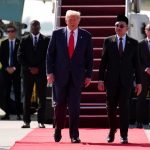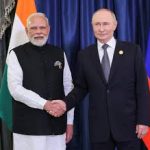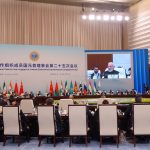Call it speed diplomacy, if you will. The friction-free India-Japan ties look set to cruise on a fast track, with the Mumbai-Ahmedabad bullet train deal already done, and waiting to be formally announced during Japan Prime Minister Shinzo Abe’s December 11-13 visit to India. The bullet train epitomises the starring role Japan looks poised to play in the transformation of India’s infrastructure and economic landscape. Technology and innovation, after all, remain Tokyo’s forte despite its stagnating economy, and its chief attractions for Asia’s third largest economy waiting to climb up the ladder.
Economic Dynamism: Raising the Bar
Upgrading and revitalising economic partnership will, therefore, top the Abe Agenda during his India journey. There is a striking convergence of interests in this area as the recession-hit Japanese economy is looking to cash in on new opportunities offered by India’s rapidly growing economy and the country’s swelling middle class of quality conscious consumers. During Prime Minister Narendra Modi’s visit to Tokyo last year, Japan had pledged the headline-hogging $33.5 billion financial package for a host of projects in India. Most of these investments remain in the pipeline; the swiftness that was shown in clearing the bullet train should be shown in fast-tracking the much-needed funds.
Japan is currently the fourth largest foreign direct investment (FDI) contributor to India, with major stakes in pharmaceuticals, automobiles, and services sectors accounting for 7.46 per cent of total FDI equity inflows into India. During April 2000-November 2014, FDI from Japan into India was estimated at $17.55 billion. Besides, there are 1209 Japanese companies registered in India and 3961 establishments of Japanese businesses operating in India. Bilateral trade is around $16 billion, less than one-fourth of India’s trade with China, with which India has many differences. This is a reasonably good base to operate from, but given the huge potential this is just the tip of the iceberg. Abe’s visit, India hopes, will impart a fresh momentum to overall economic relations.
Big deal: Breakthroughs
Carrying on with the bullet train metaphor, there are two breakthroughs waiting to happen, which will put India-Japan ties on the fast-track. Firstly, it’s time for the long-negotiated nuclear deal to pick up speed and culminate in a mutually acceptable agreement. In a sense, like with the India-US relations, it’s the last hurdle to be cleared to pave the way for a decisive transformation of India-Japan relations.
Given Japan’s pacific constitution and its sensitivity to nuclear proliferation that emanates from being the only victim of the nuclear attack, one can understand Tokyo’s continuing circumspection on going ahead with a civil nuclear agreement with a country which has not signed the Nuclear Non-Proliferation Treaty (NPT). But smart diplomacy is about converting the challenge into opportunity. PM Abe has rightfully identified building closer strategic and economic ties with India as his core foreign policy priority, and the consummation of the nuclear deal should be an integral part of this agenda.
There are still lingering differences on the contentious issue of testing, with Tokyo’s hawkish non-proliferation lobby pushing for the termination of the nuclear agreement in case India conducts a nuclear test. The testing clause was also the last mile hurdle in the way of the India-US nuclear deal, with the US agreeing to factor in circumstances of testing before deciding on terminating the nuclear agreement. The same formula, along with India’s Japan-specific assurances on the end use of atomic material and equipment supplied by Japan, can pave the way for a breakthrough. Negotiators of both sides are understood to be working overtime to square up these differences to firm up a mutually acceptable draft of the agreement. There is a strong possibility that the deal will be wrapped up during Abe’s visit, with the two sides declaring that it will be signed later. The time for a thousand visions and revisions is over; Japan must seize the moment to bite the bullet and go ahead with the nuclear deal, leading to a lasting transformation in India-Japan relations.
Make in India
Secondly, in the military-strategic sphere, one is also expecting a closure of the deal on the sale of US-2 amphibious maritime reconnaissance aircraft to India. The deal should also have a Make in India component, which will make Tokyo an indispensable partner in India’s quest to modernise its military-industrial complex.
Strategic Concord
Strategically, the Abe visit will see the two countries coming together in a tighter embrace, especially in the context of the flux in the Asia-Pacific region and the proliferation of new security threats in the region. Shedding ambivalence and diffidence that marked the previous dispensation in New Delhi, the Modi government has pushed the envelope for India-Japan strategic partnership by inviting Japan Navy for the Malabar exercise in October this year. There is a plan to regularise the participation of Japan in the Malabar exercise, which will deepen security cooperation between the two countries. Japan’s permanent inclusion in the Malabar exercise, along with the first trilateral meeting of foreign ministers of India, US and Japan, make the three countries key stakeholders in promoting multi-polarity in the Asia-Pacific region and preserve core values of freedom of navigation and global commons.
China Containment? Co-creating an Asian Century
Some analysts are prone to portray the growing India-US-Japan bonhomie as part of a collective China containment strategy. This is a flawed reading of the situation; it’s time to junk the China containment cliché, as all three countries have extensive relations with Beijing, and strive for balance of power in the region. India, for one, needs all major power centres, including the US, China, Japan and others, to fructify its larger development and global agenda. Co-creating an emerging Asian century, and not containment, should be, therefore, at the heart of this new fast-track phase in India-Japan relations. Above all, Prime Minister Abe’s visit will underline the concord of Asia’s leading democracies in fashioning the contours of a multi-polar Asia, and an economically vibrant Asian hemisphere.
Author Profile

- Manish Chand is Founder and Editor-in-Chief of India Writes Network (www.indiawrites.org) and India and World, a pioneering magazine focused on international affairs. He is CEO, Centre for Global India Insights, an India-based think tank focused on global affairs.
Latest entries
 India and the WorldOctober 26, 2025Act East: Five reasons why ASEAN summit in Malaysia matters
India and the WorldOctober 26, 2025Act East: Five reasons why ASEAN summit in Malaysia matters India and the WorldOctober 25, 2025Malaysia Summit: India can play a bigger role in ASEAN: Anil Wadhwa
India and the WorldOctober 25, 2025Malaysia Summit: India can play a bigger role in ASEAN: Anil Wadhwa India and the WorldOctober 2, 2025With US frowning, India to host Putin in December
India and the WorldOctober 2, 2025With US frowning, India to host Putin in December India and the WorldSeptember 1, 2025Tianjin boost for India: SCO rises against cross-border terror
India and the WorldSeptember 1, 2025Tianjin boost for India: SCO rises against cross-border terror










